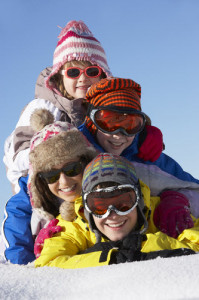WINTER WONDERLAND!
It is easy to make sure that you have the essentials; warm gloves, hats, a warm coat, good snow boots and even hand warmers for many of us. There is one piece of winter clothing that many people tend to overlook – eye gear. Having the proper eye gear can help to reduce the chances of snow blindness.
Snow blindness, also known as Photo keratitis, is when the cornea becomes inflamed from exposure to the harmful UV rays of the sun. The reason this condition is referred to as snow blindness is due to the reflection of the sun’s rays off of the snow. It is most common in people partaking in snow sports such as skiing, snowboarding or mountain climbing. Snow blindness can also be experienced by people enjoying the beautiful winter scenery with the lack the proper eye protection or use no eye protection at all.
Some of the symptoms include bloodshot eyes, uncontrollable eyelid twitching, eye pain and increased tearing or watering of the eyes. Many times these symptoms will not immediately present themselves. Like your skin becoming burned by the sun on that summer vacation at the beach, you will often begin to experience symptoms of snow blindness hours after the damage has been done. If you find that you experience these symptoms, get out of the sunlight. The best course of action to help speed up the recovery is to stay inside in a darker environment, cover your eyes with a cloth or material to block out light from getting to your eyes, and, most importantly, remove your contacts. Full recovery can take anywhere from 1-3 days depending on the severity of damage done. If symptoms persist, it is important to seek medical treatment to help reduce the chances of permanent damage. Repeated suffering from snow blindness can also increase your risk of permanent damage to your eyes and can reduce your ability to see.
PREVENTION! The best way to reduce the chances of suffering from snow blindness is to make sure that you have the proper sunglasses, snow goggles, or glacier goggles.
Sunglasses: If you choose to use sunglasses make sure that they have high UV protection. Wrap around style with full eye coverage are the best to prevent light from getting around the glasses to your eyes. Also be sure to get polarized, dark, mirror-coated sunglasses for best protection.
Glacier Goggles: Glacier goggles or glacier glasses are specifically designed for people who partake in the outdoor activities that would lead to snow blindness. They are usually darker than most sunglasses or goggles and come with mirrored and polarized lenses. The glacier sunglasses often have added plastic or other material that helps to block the sun from getting around the glasses to your face.
Snow Goggles: While many snow goggles help to keep snow out of your eyes and do help block out the sunlight, most often they do not provide great protection from the sun. While we all look for the best deal and go with a cheaper product, this is one of those things that you might want to consider spending a little more to get a pair of goggles that will properly protect your eyes.
So this year as you slide your feet into the warm boots, throw on your winter jacket, and get dressed to go outdoors, don’t forget to grab the eye gear that you need to keep your eyes protected.
About the author: John D. Bissell, owner of Bissell Eye Care and Tri-State Low Vision Services, offers comprehensive eye examinations for the entire family, ocular disease detection and treatment, eye glasses, sun glasses, active wear, contact lenses, and low vision examinations for those with significant vision loss. He has undergone specialized training for treatment of low vision by the International Academy of Low Vision Specialists utilizing customized telescopic eyeglasses, prisms and telescopic implants for patients who qualify. The practice accepts most types of vision and health insurance plans.

